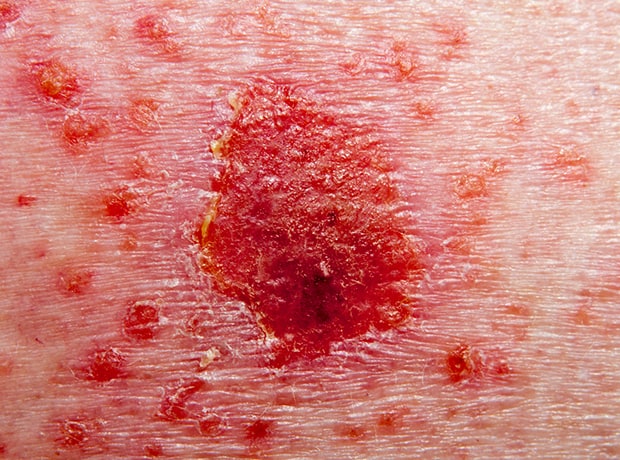Sanofi and Regeneron’s experimental therapy dupilumab has hit primary and secondary targets in a late-stage trial assessing its effectiveness in patients with poorly controlled atopic dermatitis.
Moderate-to-severe atopic dermatitis is a serious, chronic inflammatory skin disease characterised by widespread rash, itching and associated psychosocial comorbidities.
Data from the one-year LIBERTY AD CHRONOS trial showed that adding dupilumab to topical corticosteroids (TCS) significantly improved measures of overall disease severity compared to placebo/TCS.
After 16 weeks (the primary endpoint), 39 percent of patients who received dupilumab 300mg with TCS either weekly or every two weeks achieved clearing or near-clearing of skin lesions, compared to 12 percent of patients receiving placebo/TCS.
Sixty-four of patients who received the 300mg weekly dupilumab/TCS regimen, and 69 percent of those treated every two weeks, achieved EASI-75, a 75 percent reduction on an index measuring eczema severity, versus 23 percent in the placebo arm.
After 52 weeks (the secondary endpoint), 40 percent taking dupilumab/TCS weekly and 36 percent taking it every two weeks achieved clearing or near-clearing of skin lesions, compared to 12.5 percent of in the placebo/TCS group. On the EASI-75 score, the numbers were 64 percent, 65 percent and 22 percent, respectively.
The findings also showed that patients were less likely to discontinue therapy in the dupilumab/TCS arm of the trial than those taking the placebo regimen (15 percent in both dupilumab groups; 33 percent placebo), while the overall rate of adverse events was comparable (83 percent for the weekly dose, 88 percent for the every two weeks dosing group, and 84 percent for placebo).
“This is the first long-term Phase III data that demonstrated dupilumab with topical corticosteroids was superior to topical corticosteroids alone, and provided sustained efficacy, significantly improving measures of overall disease severity, skin clearing, itching, and quality of life through one year of treatment,” noted George Yancopoulos, chief scientific officer of Regeneron and president of Regeneron Laboratories.
“Although topical corticosteroids are standard therapies for atopic dermatitis, they are non-specific anti-inflammatory agents, while dupilumab is a targeted therapy that specifically blocks the IL-4/IL-13 signaling pathway. Our collective clinical data demonstrate that this pathway is a root cause in atopic dermatitis, asthma and nasal polyposis and we continue to evaluate the potential of this pathway in these atopic and allergic diseases.”
The firm said the data will underpin a US regulatory submission for dupilumab, which is on track for the third quarter of this year.










